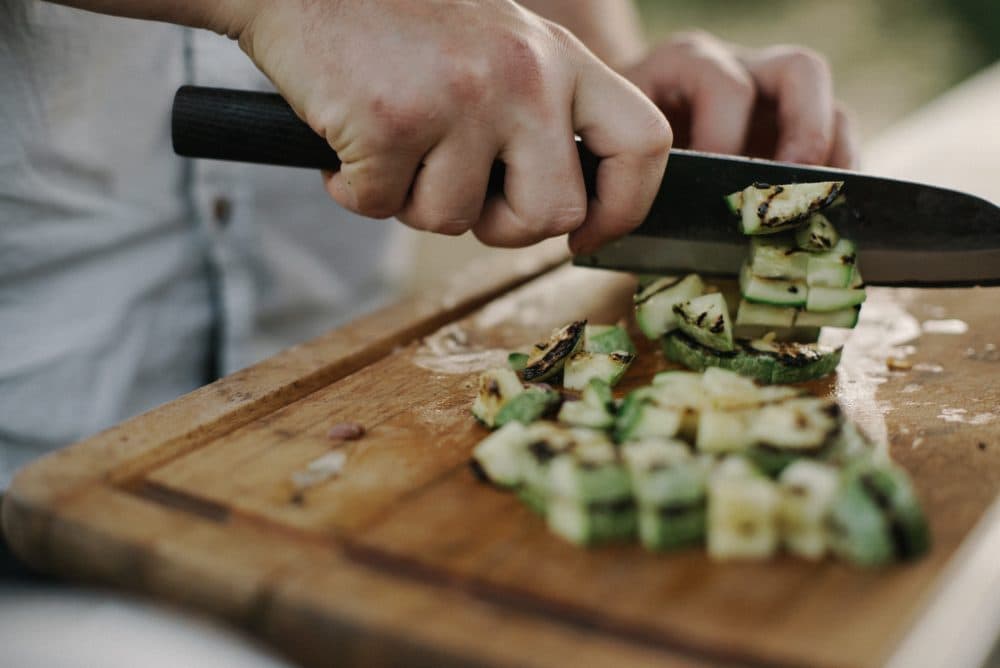Advertisement
Commentary
Coping With The Pandemic, And Finding Purpose, In My Kitchen

Given the recent shortages of yeast, sugar and flour, it’s clear that baking supplies are vying with toilet paper as priority purchases when sheltering in place. Luckily, I am not a baker. Cutting smooth slices from those cylinders of chocolate chip cookie dough is about as close as I’ve ever gotten to making home made cookies, and even that was taxing.
But I do cook, and have found planning and preparing meals to be essential to my mental health in these days of high stress and few distractions.
I’ve discovered a sort of serenity in the tedium of dicing vegetables, appreciating the crack of the knife blade on the cutting board and the curve of the peel as it’s lifted from the carrot. When I rub the dried dill between my palms before sprinkling it, its herby tang startles and delights me. I realize this sounds goofy, but the wildly different aromas now infusing my house — of fresh pineapple, newly ground coffee, grilled fish, peanut butter and jelly and chicken vegetable soup — ease my restlessness. Each new whiff makes me feel as though I’m somewhere new.
I’m engaging in comfort cooking — far more than in comfort eating.
Conscious of potential scarcity, I’ve actually found myself ingesting less than usual despite being home almost all of every day. In fact, it’s that drive to conserve, to stretch every ingredient that I’ve got, that’s made cooking such an engaging daily adventure.
I’m engaging in comfort cooking -- far more than in comfort eating.
“Adventure” is a term I’m using only half-ironically. I grew up reading and rereading the story of Heidi of the Swiss Alps, an orphan who lived with her goat-herding grandpa and seemed to subsist on bread and Swiss cheese (the hole-filled food as exotic as it was disappointing when I finally got to taste it). That book and my dog-eared copy “Eskimo Folk Tales” — which featured drawings and vivid accounts of children who caught salmon, wrestled walruses and slaughtered seals — were my springboards into a rich fantasy life, in which a well-fed suburban child like me faced hardship and deprivation with resourcefulness and aplomb.
The other night as I crafted a concoction of cannellini beans, oranges, olives and just a small amount of chicken, I felt reconnected to that child. The oh-so privileged, First World challenges of finding groceries online and people to deliver them without jeopardizing their safety or mine has fueled that romantic desire to face hardship with spunky practicality.
Advertisement
Now when I assemble the grocery list (and until social distancing, I never made lists, relying instead on habit and impulse), I assume it may well be my last for weeks or months to come. I’m adding to it healthy non-perishables, not just fresh produce. I’m even more conscious of what foods provide protein and which ones have iron; of where Vitamins C and D are to be found, besides the morning pill I pop into my mouth. Our spinning kitchen shelf is now a Sagging Susan, not a Lazy one, laden with bags of dried beans and fruits, jars of peanut butter and cans of tuna.
Now creating a meal that’s tasty, healthy and smart ... subtly fuels the childhood fantasy that I am calmly, capably coping with adversity.
If I wasn’t in my mid-60s and thus a member of the high-risk group, I’d try to be out in the world more, giving blood and delivering food. Instead, I’m hunkered down desperately looking for ways to feel useful. But besides donating money to various relief funds and tepidly re-engaging in electoral politics, I’m not, and can’t deceive myself otherwise. So I’m settling for scrappy.
Now creating a meal that’s tasty, healthy and smart in its balance of ingredients feels not just creative, but subtly fuels the childhood fantasy that I am calmly, capably coping with adversity. I know that not being able to get my favorite brand of cottage cheese online hardly qualifies as hardship, that what my husband and I are lucky enough to be experiencing is temporary inconvenience, not suffering.
But the demands to be intentional, to apply foresight and a modicum of ingenuity to what we eat and how to prepare it — those are real. I hope that the lessons I’m learning — in how to select and stretch ingredients and find pleasure in conserving more than consuming — are not transient. I don’t want to revert to my old ways.
I’m grateful to feel again like the 7-year-old me who inched a sticky finger across the words of those story books imagining herself to be like their heroes; a girl able to face hardship with an understanding of necessity and satisfied by simple pleasures.
Back then I merely pretended. Maybe now I’ll make it real.
